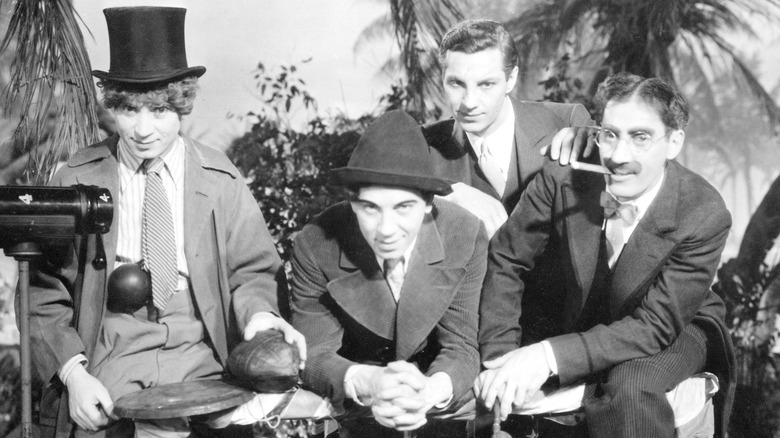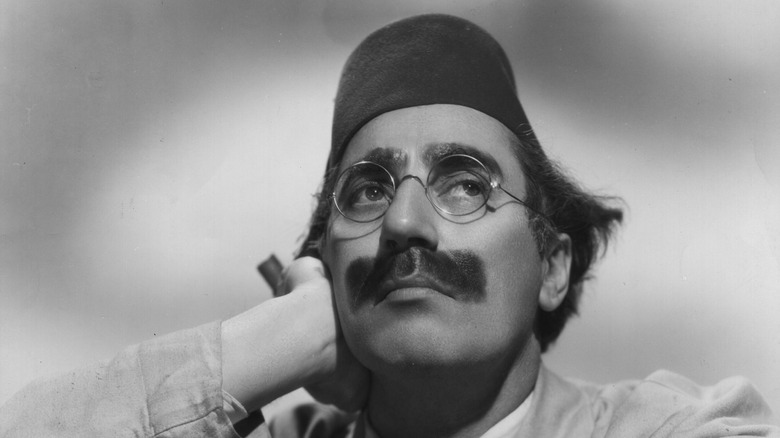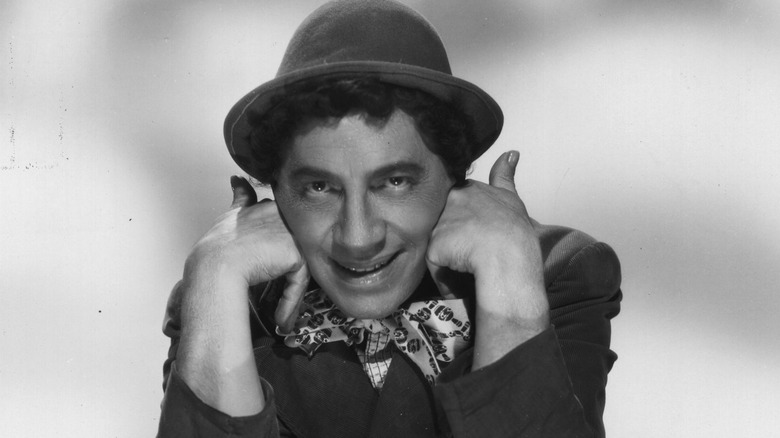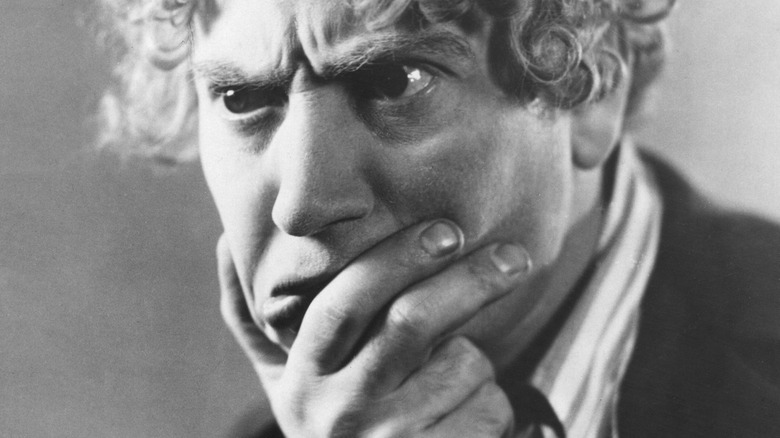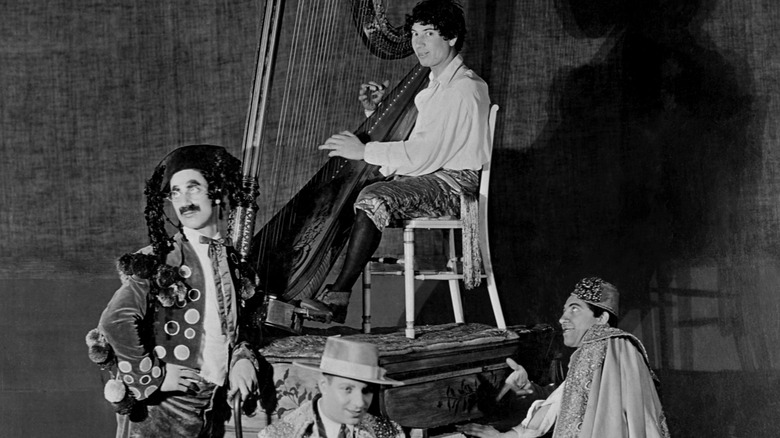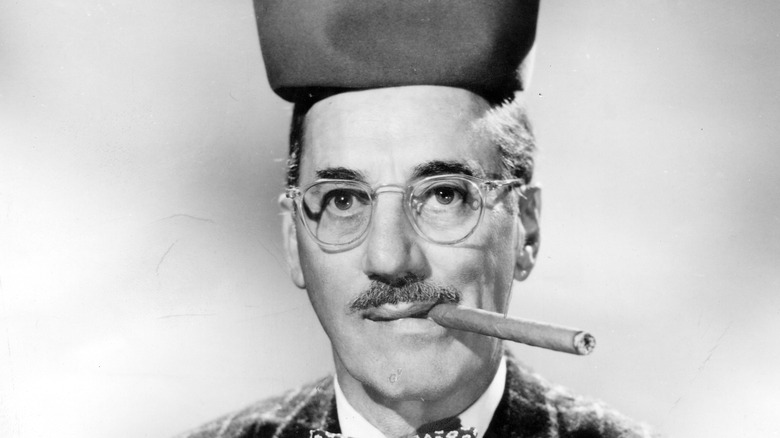The Marx Brothers' Family Tree Explained
The Marx Brothers (pictured above) are one of Hollywood history's most beloved comedy acts. Several of their feature films are considered by the American Film Institute to be among the funniest American movies ever made. Performing in a group sometimes as large as five but most often only three, the Marx Brothers were led by Julius Henry Marx, who performed as Groucho. Typifying their routines were visual comedy and clever wordplay. Groucho's mustache, glasses, greasepaint eyebrows, and cigar remain iconic to this day.
There's a lot more to know about the history of the Marx Brothers than just what appeared on screen. Their career began in the days of vaudeville and stretched all the way through the rise of television. For example, familial relations are implied right there in the name. Were the members of the Marx Brothers actually related? Each one did, after all, perform with a stage name.
They really were brothers
The first thing to know about the family tree of the Marx Brothers is that they were, in fact, all brothers. In addition to Groucho, there was Leonard Marx, performing as Chico; Adolph Marx, who performed as Harpo; Milton Marx, known as Gummo; and Zeppo, whose real name was Herbert Marx. They were the children of immigrant parents, born in the late 19th century (except Zeppo, in 1901). Groucho was the first Marx brother to perform on stage. Their career began in vaudeville and then transferred to Broadway before finding success in Hollywood, beginning in the 1920s, per Britannica.
Eventually, Gummo and Zeppo fell away from the act, leaving Groucho, Harpo, and Chico to form the core of the group. Groucho (pictured above) became associated with a rapier wit (many of his best quotes are still in use), with Harpo playing a non-speaking clown-like character who was often the punchline for chaotic visual humor. With a put-on Italian accent, Chico rounded out the trio, playing a somewhat dunderheaded character with good intentions. Music was also a crucial part of his contribution to their routines.
Was one brother even real?
Their father's original name was Marrix, eventually simplified to Marx, reports All Music. Few people realize there was actually a six Marx brother, the first-born, named Manfred, who tragically died in infancy. There was even some question whether this brother ever actually existed. His death certificate has been found, however, in Manhattan. The cause of death listed as "entero-colitis, with asthenia contributing," now generally believed to be influenza, according to Marxology, an authoritative fan site. The next child of Minnie and Simon (Sam) Marx, Leonard (Chico, above), would pick up the middle name Manfred in tribute.
It's also believed that losing their first-born child made Minnie especially protective of her surviving children. Leonard in particular was smothered with attention. Groucho recalled her saying, "Sam [her husband] can cough all night and I never hear him, but if one of my boys coughs just once, I'm wide awake" (per Marxology). Manfred Marx is interred at New York's Washington Cemetery next to his grandmother, Fanny Schönberg, who died in 1901. There's even a rumored seventh Marx brother, Sam, listed in the 1905 census. Sam's existence has never been proven, and many believe he may have simply been a relative visiting the family at that time.
Was there a mysterious Marx sister?
As well as five brothers, there was also a Marx sister — well, sort of. In the 1905 census the Marx Family is listed with five boys and one girl, named Pauline, who was 15 at the time, born in 1885, according to The New York Times. It's now known Pauline was not an actual sister of the performing Marx Brothers but a cousin, adopted by Minnie Marx from her sister Hannah, and likely born out of wedlock, which was highly controversial in that era, per Culture Trip.
Pauline eventually became like an older sister to the more famous Marx Brothers. One can only imagine what a headache it must have been to keep those five mischievous boys in line. Pauline was without a doubt a beloved member of the Marx family. Harpo (pictured above) later wrote in his autobiography ("Harpo Speaks!" from 1961) that she was "adopted as one of us" (per Marxology). One additional note: The date of Minnie and Sam Marx' wedding was bumped back a year to accommodate Pauline's birthdate, completing the illusion she was a member of the family, and not born illegitimately to Minnie's sister. The biological father of Pauline Marx remains unknown.
They were related to their manager
The family tree of the Marx Brothers (pictured above on Broadway, 1928) makes one thing readily apparent: Show business ran in their blood. Their mother's brother — their uncle, Abraham Elieser Adolf Schönberg — was a successful performer under the name Al Shean, part of the popular vaudeville headlining act Gallagher and Shean (per Britannica). Described as a "domineering stage mother" (per Britannica), Minnie was closely involved in the success of her brother, and she was closely involved in the blossoming careers of her children as well. She ended up managing the brothers' act under the name Minnie Palmer, according to People Pill.
Groucho got his start in 1905 singing on his uncle's stage show. It's easy to imagine Minnie pulling the strings to make it happen. By 1907, Groucho and Gummo were singing together as "The Three Nightingales," along with Mabel O'Donnell, per the Marx-Brothers website. Minnie managed that group and would even get her chance to perform on stage in 1910, when she joined the Nightingales alongside her sister Hannah.
Show business was a family affair
Further evidence that show business was a family affair for the Marx family can be found in the Marx brothers' maternal grandparents, Levy and Fanny Schönberg. The couple had eight children. The Marx Brothers' mother Miene (later Minnie) was born in northern Germany in 1864, according to Marx-Brothers. Fanny was a harp player and performer, and is credited with introducing Harpo to the instrument. Levy is said to have been a ventriloquist.
After examining the Marx Brothers' family tree, it's clear these five brothers were destined for greatness, and that they were meant for life on the stage. Would a different family background have produced different results for the Marx Brothers? At this point, that's pure speculation. But from stage-managing mothers to a mysterious brother who may or not have been real, the family story of the Marx adds a whole new element to their classic comedy.
